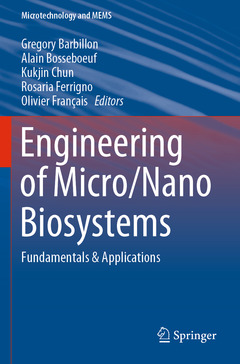Description
Engineering of Micro/Nano Biosystems, 1st ed. 2020
Fundamentals & Applications
Microtechnology and MEMS Series
Coordinators: Barbillon Gregory, Bosseboeuf Alain, Chun Kukjin, Ferrigno Rosaria, Français Olivier
Language: English
Subjects for Engineering of Micro/Nano Biosystems:
Publication date: 08-2020
Support: Print on demand
Publication date: 08-2019
368 p. · 15.5x23.5 cm · Hardback
Description
/li>Contents
/li>Biography
/li>Comment
/li>
This tutorial book offers an in-depth overview of the fundamental principles of micro/nano technologies and devices related to sensing, actuation and diagnosis in fluidics and biosystems. Research in the MEMS/NEMS and lab-on-chip fields has seen rapid growth in both academic and industrial domains, as these biodevices and systems are increasingly replacing traditional large size diagnostic tools. This book is unique in describing not only the devices and technologies but also the basic principles of their operation.
The comprehensive description of the fabrication, packaging and principles of micro/nano biosystems presented in this book offers guidance for researchers designing and implementing these biosystems across diverse fields including medical, pharmaceutical and biological sciences. The book provides a detailed overview of the fundamental mechanical, optical, electrical and magnetic principles involved, together with the technologies required for the design, fabrication and characterization of micro/nano fluidic systems and bio-devices.
Written by a collaborative team from France and Korea, the book is suitable for academics, researchers, advanced level students and industrial manufacturers.
Chapter 1. Introduction
Chapter 2. Basics of micro/nano fluidics and biology
2.1 Introduction2.2 Fluidics at micro/nano scale
2.3 Biomolecular interactions
2.4 Micro Particle Image Velocimetry technique
2.5 Main ex-situ characterization techniques for bio-devices
References
Chapter 3. Micro/nano Fabrication and packaging technologies for biosystems
3.1 Introduction3.2 Micro/nano fabrication for fluidic devices
3.3 Surface biofunctionalization engineering for bioreceptors and antifouling coating
3.4 Packaging technologies for fluidics and biodevices
Chapter 4. Mechanics for fluidics and bio devices
4.1 Introduction
4.2 Mechanical microcomponents for fluidics
4.3 Passive microfluidics
4.4 Mechanics for bio devices
References
Chapter 5. Optics and fluidics
5.1 Introduction
5.2 Integration of optics in biodevices
5.3 Optofluidics
Chapter 6 Electricity for fluidics and biodevices
6.1 Introduction
6.2 Micro- and Nano- scale electrokinetics
6.3 Electrostatics for biodevices : dielectrophoresis
6.4 RF and microwaves for fluidics and bio devices
References
Chapter 7. Magnetophoresis in bio-devices
7.1 Introduction
7.2 Magnetism principles for magnetophoresis
7.3 Magnetic micro- or nano-object transport in magnetophoretic system
7.4 Implementation of magnetophoresis in microsystems
7.6 Conclusion
Chapter 8 conclusion
Dr. HDR. Grégory Barbillon completed his PhD in Physics (2007) with greatest distinction at the University of Technology of Troyes (France). Then, he obtained his Habilitation (HDR) in Physics (2013) at the University of Paris Sud (Orsay, France). From September 2017, he is Professor of Physics at the Faculty of Engineering "EPF - Ecole d'Ingénieurs" (Sceaux, France). His research interests are focused on Plasmonics, Nano-Optics, Non-Linear Optics, Nanophotonics, Condensed Matter Physics, Optical Sensing, Biosensing, Nanotechnology, Surface Enhanced Spectroscopies, Sum Frequency Generation Spectroscopy, Materials Chemistry, Physical Chemistry, Fluorescence.
Dr. Alain Bosseboeuf received in 1980 a master degree in microelectronics from INPG and a telecommunication engineer diploma from ENSTBr and in 1981 a master degree in Solid State Physics from University Paris 6. He received in 1989 the state PhD degree in Physics from University Paris Sud (Orsay). Since 1983 he works as a CNRS full-time researcher first in Institut d’Electronique Fondamentale (IEF) and since june 2016 in Centre for Nanoscience and nanotechnology (C2N) a joint research institute of CNRS and University Paris-Sud. He worked for 10 years on thin film deposition and characterization and then in the field of micro/nanosystems. He led for 10 years the research group “NanoBio and Micro/nanosystems” of IEF. He belonged to various expert, steering and conference committees in the field of microsystems. Since November 2005, he is coordinating the international research network NAMIS (Nano and Microsystems) involving 12 partners from 10 countries and 3 continents. His current interests include thin films, MEMS and packaging technologies, and the development of associated characterisation tools.
Prof. Kukjin Chun received the B.S.degree in Electronics Engineering from Seoul National University in 1977 and the M.S. and Ph.D. degrees in Electrical Engineering
Brings together expertise in biology, fluidics, mechanics, optics, electrical engineering, magnetism, micro/nano fabrication and characterization techniques for the design and building of bio-devices and lab-on-chip systems
Provides comprehensive information on biological processes and physical phenomena at the micro/nano scale involved in transport, manipulation and bio sensing in highly miniaturized fluidic and/or bio-devices
Covers a broad range of techniques used in state-of-the-art micro/nano fluidic and bio devices both from the theoretical and engineering point of view
Explains remaining scientific and technical challenges to overcome commercialization bottlenecks and gives general guidelines for the design of state-of-the art micro-nano Biosystems




